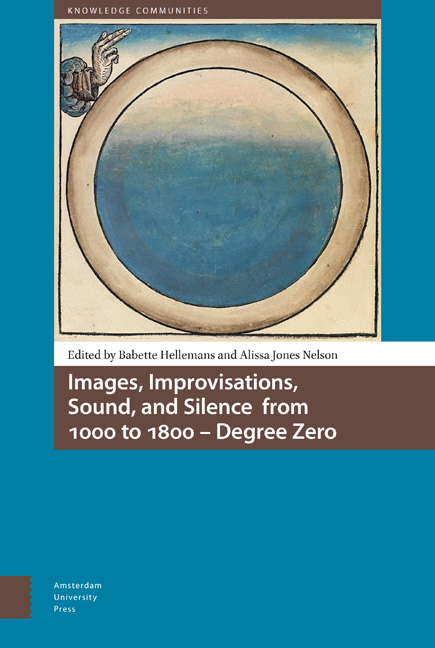Preface and Acknowledgements
Published online by Cambridge University Press: 11 December 2020
Summary
Suppose that the future of the humanities is to be found either in the myth of a full grasp of language and the arts or the desire to have such a grasp, or else in the myth that one may have none – against the privileged claim of possessing the truth and the autonomy of the object in the arts. How would it be possible for future generations of scholars in the humanities to work with artists? Can we find a common ground between the two that does justice to both of their raisons d’être? Through the meetings and discussions I organized as the project leader of the research project Degree Zero of Sound and Image, c. 1000–1800, I have become more aware of the fragility of these questions – and their importance.
From the very first meetings of this project, I have counted on the encouragement of Rokus de Groot, Bernard Jussen, Jean-Claude Schmitt, Asghar Seyed-Gohrab, and Irene Zwiep, who have always supported my intellectual bravado. Only a few people know how much Burcht Pranger’s not-so-silent voice in this volume means: the company of an extraordinary and graceful soul.
The meetings preceding the volume were part of the Internationalization for the Humanities Grant funded by the Netherlands Organisation for Scientific Research (NWO). The beautiful surroundings of the dunes and the North Sea at the Netherlands Institute for Advanced Studies in Wassenaar created an ideal place to start the project in 2013. The Groupe d’Anthropologie Historique de l’Occident Médiéval at the École des Hautes Études en Sciences Sociales in Paris was very hospitable in helping to organize the meeting in 2014. Pierre Monnet, director of the Institut Franco-Allemand/Sciences Historiques et Sociales in Frankfurt, offered us good times and Gemütlichkeit at his institute in 2015. The Mediävistenverband in Bonn provided us with the facilities to be able to organize two sessions in the spring of 2017.
- Type
- Chapter
- Information
- Publisher: Amsterdam University PressPrint publication year: 2018



